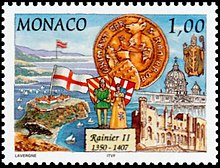You can help expand this article with text translated from the corresponding article in Italian. (October 2012) Click [show] for important translation instructions.
|
Rainier II, Lord of Monaco (1350–1407), was the monarch of Monaco from June 29, 1352 to August 15, 1357.[1] He was the son of Charles I, Lord of Monaco, and Lucchina Spinola. He ruled jointly with his father, his father's uncle Antonio, Lord of Monaco and his brother Gabriele, Lord of Monaco. He yielded Monaco to the besieging Genoese for 20,000 fl. but retained Menton and Roquebrune.

He was Admiral of Languedoc and Seneschal of Piedmont.[2] He fought with the French army in the Battle of Poitiers.[1] France's terrible losses in that epic battle led to sweeping military reforms by King Charles V of France. Monaco's port benefited directly from these.[1] While escorting convoys of French merchant ships in the English Channel, he was captured by John of Lancaster, 1st Duke of Bedford.[1] John of Lancaster sold his noble prisoner to his King, Edward III of England.[1]
Marriage and issue
editFirst childless marriage to Maria del Carretto, daughter of Giorgio Marchese di Finale e Noli (Marquis/Margrave of Final and Noli) & his wife Leonora Fieschi.
He married secondly to Isabella Asinari.
Issue:
- Ambroise, Lord of Monaco
- Anthony II, Lord of Monaco (alternately Antoine)[3]
- Giacomo of Monaco
- Giovanna of Monaco
- Giovanni I (Jean I, Lord of Monaco)
- Gaspare of Monaco
- Maria of Monaco
- Griffeta of Monaco
- Enrico of Monaco
Succession
editHe was succeeded by his three sons Ambroise, Antoine, and Jean who ruled Monaco jointly.[3]
Notes
edit- ^ a b c d e "Mad for Monaco: Lord Rainier II of Monaco". 2018-09-01. Archived from the original on 2018-09-01.
- ^ "PRINCIPAUTÉ DE MONACO ANNUAIRE OFFICIEL DE LA PRINCIPAUTÉ DE MONACO". 2018-09-01. Archived from the original on 2018-09-01.
- ^ a b "The 700 Years of Grimaldi". 2012-12-19. Archived from the original on 2012-12-19.